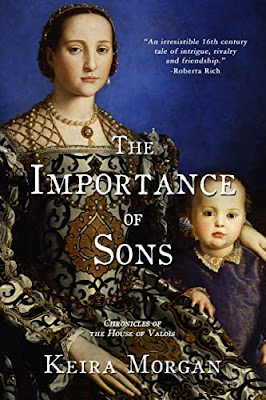In 1491, France conquers Brittany. As part of the peace treaty, fifteen-year-old Duchess Anne must marry the young French king. She arrives in France, defeated, homesick and surrounded by enemies. Once the ruler of her duchy, her only value and duty as queen is to provide an heir. With only her pride to sustain her, can Anne make a place for herself in her enemy’s court?
Thank you for inviting me to your blog. I am a fan of yours, for we write of the same period, in neighbouring and normally enemy countries.
In my previous interview, I mentioned that my second book would focus on the enmity between Queen Anne and Countess Louise d’Angoulême and answer to questions. Why and how had their animosity come about? What events had occurred for it to become so deep and rancorous? I didn’t have a title when I began. My research led me to the short answer, which the title summarizes: The Importance of Sons.
How I conduct my research
I think many historical novelists enjoy the research as much as writing the novel. For me, this is very much the case. Conducting the research for this second novel went much more quickly than for the first because I had already completed all the basic work. By this I mean I had already read the background books, developed a detailed timeline of Anne’s life and Louise’s life, since they were two of the major characters in The Importance of Pawns. I had also visited the major places in Brittany, the Loire Valley and Paris in which Anne and Louise had lived to have a visceral experience of the places and landscapes of their lives.
The years between 1483 and 1594—the years of the Italian Wars and the Wars of Religion in France—have fascinated me for most of my adult life. I regularly read the academic articles, the novels and the published primary research in English and French that is available on sites like Cour de France, the wonderful digital collection of Sixteenth Century French Books in Print, academia.edu, and nineteenth century and earlier novels on Project Gutenberg [I have collected them as a free list on my website since they are hard to find], to name but a few examples.
Because I now live in Mexico, I do all my research on the computer. Therefore, when I come across something that relates to my topics or era, I either download it immediately or send myself an email link. This may make me sound more organized than I am. Really, all it means is that I have a huge download archive and a mail folder called research that I clean up every couple of months. But when I need specific information, I know where to find it.
How I researched The Importance of Sons
Once I know my question for The Importance of Sons, and since I already had the main events and timelines of the lives of both Anne and Louise, I wrote an outline for the novel. I am a plotter, not a pantser. The person whose system has spoken to me is Libby Hawker, in Take Off Your Pants.
The detailed plan for my novel provides me with a starting point for the next part of my research. With it, I know what locations will be important, which characters I will use and which events I will emphasize. Then I burrow deeply to find out everything I can about those things.
For example, in this novel, there is a conspiracy in Brittany in 1492 shortly after Anne married King Charles VIII. This event could weave into the animosity between Anne and Louise. So, I researched the event to find out who was involved and how it unfolded, to create a series of fictional scenes based on historical facts.
One of the research domains that I have had to delve into that I was not expecting is genealogical research. I don’t know why I was surprised when I consider how much time my real people spent talking about who was related to whom. But now, when a new person appears on the scene, very early I poke into his or her family. It rarely takes very long to find they are related, and closely related, to the people around them. It explains many of the alliances and the issues.
Another set of tools I use frequently is everything on the internet that relates to the climate, weather, geography, topography, and history of the locations where my people live. Often there is great tourist information, Google 3-D and historical maps, virtual museum tours, tours of the towns and Châteaux, municipal and familial archives available.
I search for anything that can provide me with accurate information about the places I am writing about. My goal is to imagine myself in the setting where my people live, to picture them living, walking or riding around, smelling the odours, shivering in their castles in the winter, sweating in their heavy dresses and they dance the galliard in the great hall, reading their Books of Hours at their prie-dieux.
It helps to have travelled extensively in France, but the online materials refresh my memories and the factual information about weather, flora and fauna, history and appearance make me feel secure in my imaginings.
My Writing Technique
I start by reading the outline of the scene I plan to write and I try to do it the night before. As I do other activities, I let my imagination play around with it, with the characters and what they say, what they are wearing , things like that, since I have already determined the setting and the purpose of the scene. When I sit down, if I have a good sense of the scene, I will just write it. If I don’t. I will often do some detailed research about the setting to draw myself into the location. Most of the time, that is enough to pull me into the scene so I can write it.
What About Research Errors?
Sometimes I will find new research that alters my knowledge of the facts. Nothing so far had been earth shattering, or I should probably say, story shattering. Even if I did, I would not be crushed.
First, I am writing fiction, not history, so I look upon it as unfortunate not a professional failure. It will be something that to mention as a deviation from known facts in the afterward in another edition and on my website when I update it.
Second, historians continue to research the period, using new methods allow them to probe fresh materials to uncover different facts. One can only hope that such dedicated work will result in revised understandings of the past. The importance of women in the past has been underestimated because the historical record to date provides little about them. I can only trust that new research will turn up evidence of the greater role I am certain they played.
# # #
It helps to have travelled extensively in France, but the online materials refresh my memories and the factual information about weather, flora and fauna, history and appearance make me feel secure in my imaginings.
My Writing Technique
I start by reading the outline of the scene I plan to write and I try to do it the night before. As I do other activities, I let my imagination play around with it, with the characters and what they say, what they are wearing , things like that, since I have already determined the setting and the purpose of the scene. When I sit down, if I have a good sense of the scene, I will just write it. If I don’t. I will often do some detailed research about the setting to draw myself into the location. Most of the time, that is enough to pull me into the scene so I can write it.
What About Research Errors?
Sometimes I will find new research that alters my knowledge of the facts. Nothing so far had been earth shattering, or I should probably say, story shattering. Even if I did, I would not be crushed.
First, I am writing fiction, not history, so I look upon it as unfortunate not a professional failure. It will be something that to mention as a deviation from known facts in the afterward in another edition and on my website when I update it.
Second, historians continue to research the period, using new methods allow them to probe fresh materials to uncover different facts. One can only hope that such dedicated work will result in revised understandings of the past. The importance of women in the past has been underestimated because the historical record to date provides little about them. I can only trust that new research will turn up evidence of the greater role I am certain they played.
Keira Morgan
# # #
About the Author
Keira Morgan retired from training and management in the Canadian Public Service to follow a career as an author. She now writes from Mexico where she lives happily with a husband, two cats and two dogs. Her doctoral level studies in Renaissance history underlie her historical fiction. She writes about the turbulent sixteenth-century French Renaissance. Her stories tell of powerful women who challenged tradition to play crucial roles in French affairs. Keira also maintains a non-fiction website, All About French Renaissance Women, [https://www.keiramorgan.com] where she writes about the lives of Frenchwomen during the era. She plans to collect their biographies into a book. Find out more at Keira's website https://kjmorgan-writer.com/ and follow her on Facebook and Twitter @KJMMexico




No comments:
Post a Comment
Thank you for commenting